This recipe for Peanut Noodles features soft and chewy udon noodles with creamy curried peanut sauce, tender zucchini, and cubes of pan-fried tofu. Bonus: Leftovers make a great lunch because they can be served hot or cold!
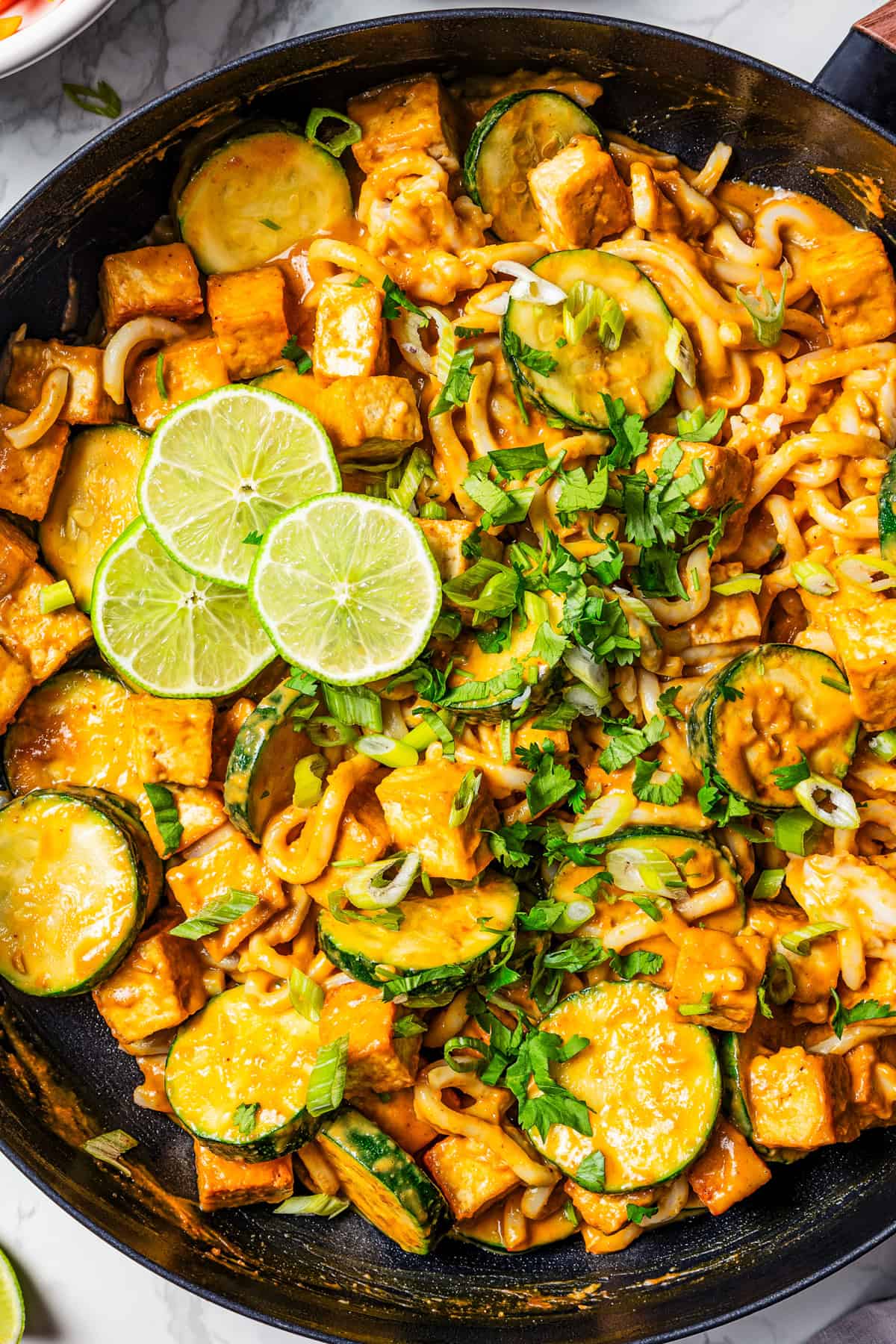
I don’t know about you, but on busy weeknights I’m all about quick recipes that make a flavorful dinner that everyone is going to devour. I usually opt for stove-top chicken thighs or garlic butter steak bites, but recently I was craving a hearty meal with some noodles in it.
The result was this peanut noodles recipe. I took basic peanut noodles and spruced them up with pan-fried tofu and zucchini, then finished it with quick pickled carrots and a few squeezes of lime juice. It all comes together in about 40 minutes and is so filling you don’t need to serve anything on the side.
Why I Love This Peanut Noodles Recipe
- Family friendly: If you’re looking for a weeknight dinner that will get everyone waiting at the table, this peanut noodle recipe is it. Kids love the peanut sauce, sweet quick-pickled carrots, and chewy udon noodles. Parents will appreciate that it’s a complete, nutritionally balanced meal in a bowl, thanks to the addition of tofu and veggies.
- Filling: Each serving has about 20 grams of protein, plus fiber and nutrients from the carrots and zucchini.
- Balanced flavors: A lot of peanut sauce recipes are cloyingly sweet, without enough acid or salt for balance. This peanut sauce is different, though. It’s made with a hefty four cloves of garlic, plenty of freshly grated ginger, and curry powder.
- One pan: You’ll only need a skillet to make these peanut noodles. Everything is cooked in stages and then mixed together, along with the peanut sauce at the end. Fewer dishes is always a win in my book!
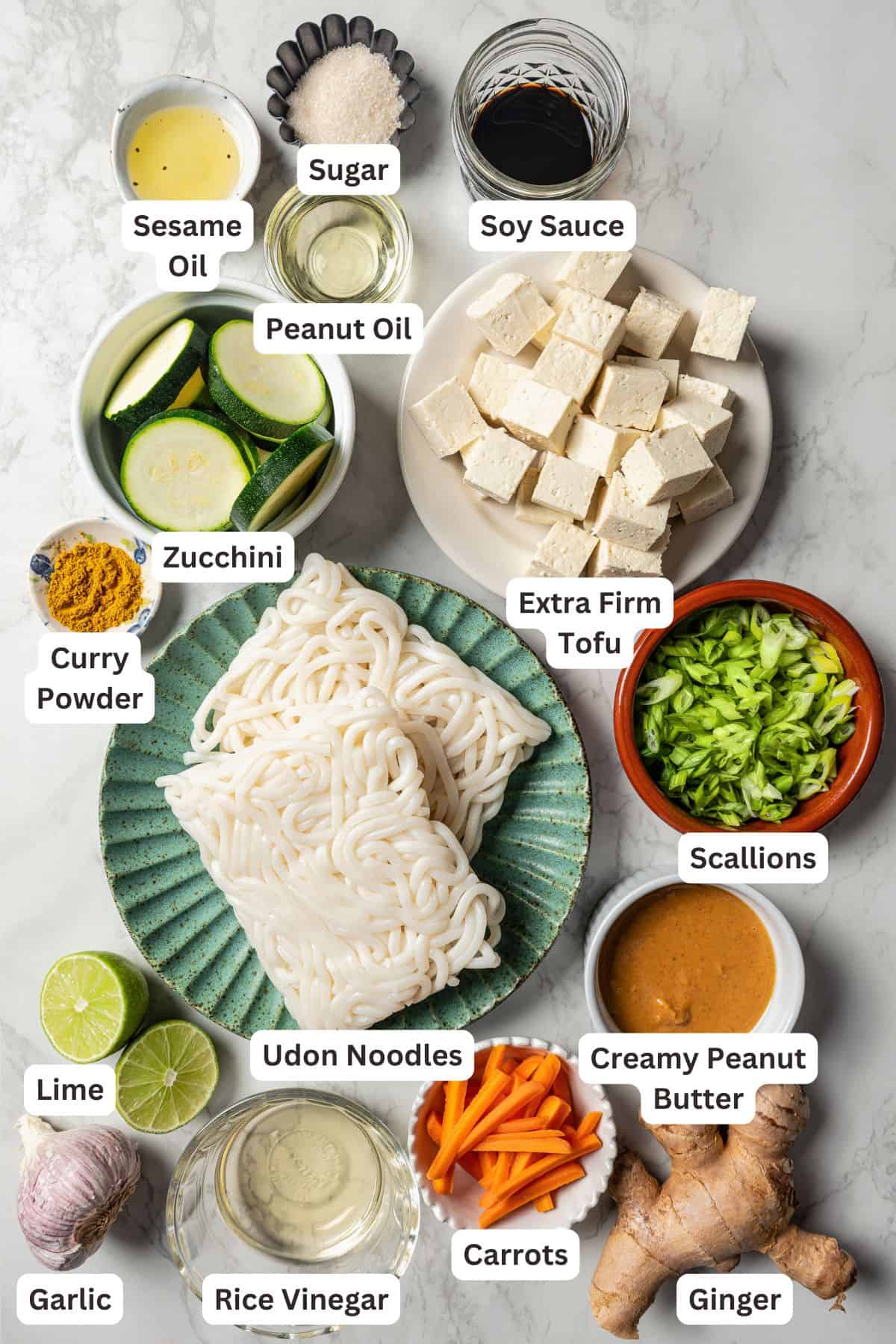

What You’ll Need
Here’s a quick look at all the ingredients used in these peanut noodles, along with some notes, including possible substitutions. Please scroll down to the recipe card for ingredient amounts and complete instructions.
- Carrots – Peeled, then shredded for a quick pickled crunch that adds texture and tang.
- Seasoned rice vinegar – Provides a mild tanginess for pickling and flavoring the sauce. If you don’t have seasoned rice vinegar, use apple cider vinegar or white wine vinegar with a pinch of sugar.
- Udon noodles – You can substitute ramen, spaghetti, or other noodles, but I prefer udon because they hold onto the sauce well and have a nice chewy texture.
- Peanut oil – Used for cooking and adding a nutty flavor. Any neutral oil like canola or vegetable oil can be used instead.
- Garlic – If you don’t have fresh garlic, you can use 1/4 teaspoon garlic powder per clove.
- Fresh ginger root – Substitute with 1/4 teaspoon ground ginger if fresh is unavailable.
- Curry powder – I use mild curry powder, but if you like more heat in your dishes, use a spicier variety.
- Peanut butter – Almond butter or sunflower butter will also work. You can also do a combination of one part peanut butter and one part tahini.
- Soy sauce – Tamari or coconut aminos can be used if you like.
- Granulated sugar – White sugar balances the savory and spicy flavors.
- Extra-firm tofu – You can use firm tofu, but anything softer than that won’t stand up well to pan-frying. Buy refrigerated tofu that comes packed in water, not silken tofu. I also recommend pressing the tofu. (See how to do that in the “Tips” section.)
- Zucchini – Broccoli is also fantastic with peanut noodles and can be used instead, if you prefer.
- Kosher salt & black pepper – Used to season the dish to your taste. Sea salt or regular table salt can also be used.
- Sesame oil – Look for the kind that’s toasted.
- Scallions – Roughly chopped to use as garnish.
- Lime – Serve your peanut noodles with lime wedges or slices. The juice is delicious when squeezed on top of the noodles.
How to Make Peanut Noodles
Cooking the zucchini and tofu separately is important for this dish because it ensures that each ingredient has the right texture. Below is a step-by-step guide to making peanut noodles.
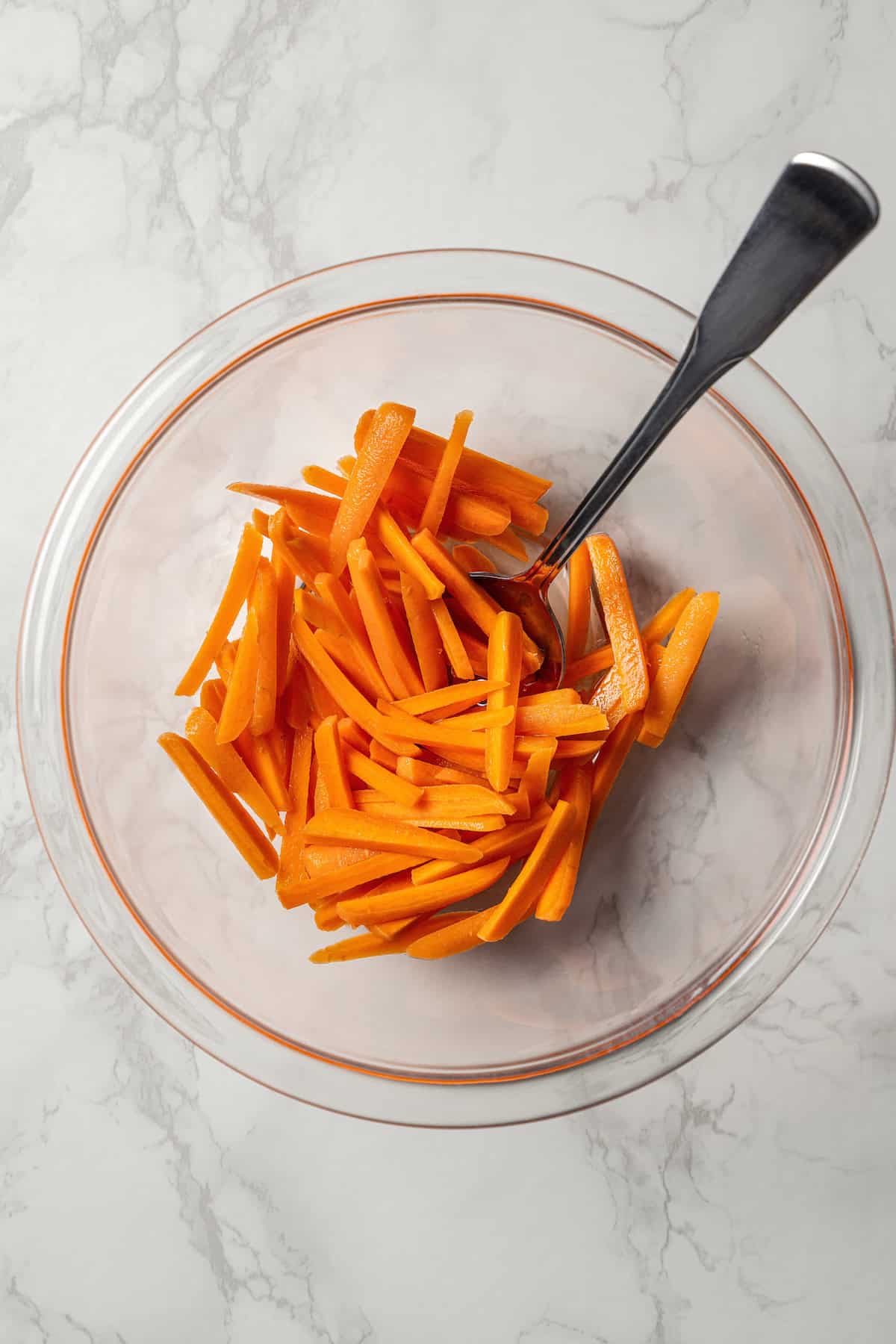

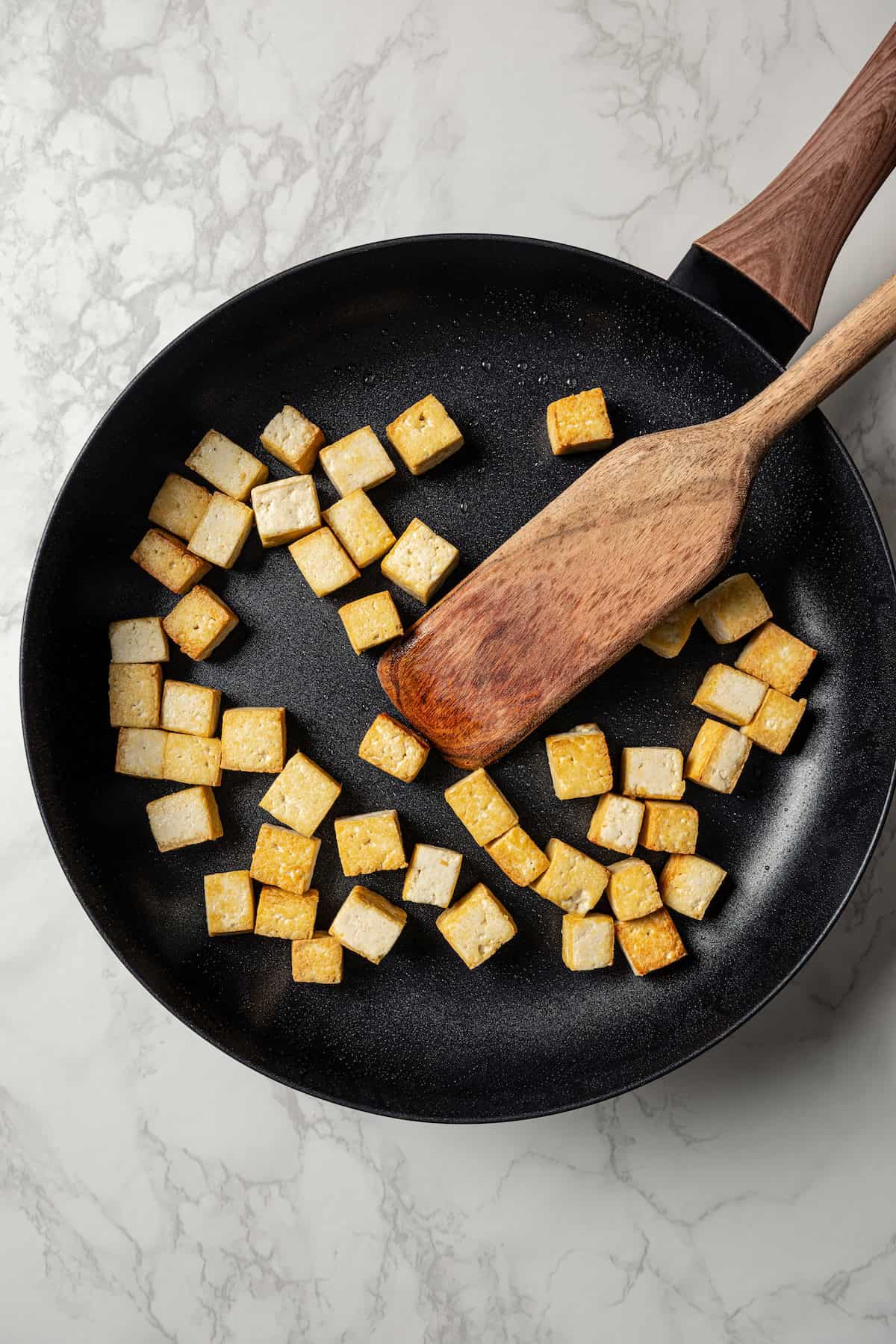

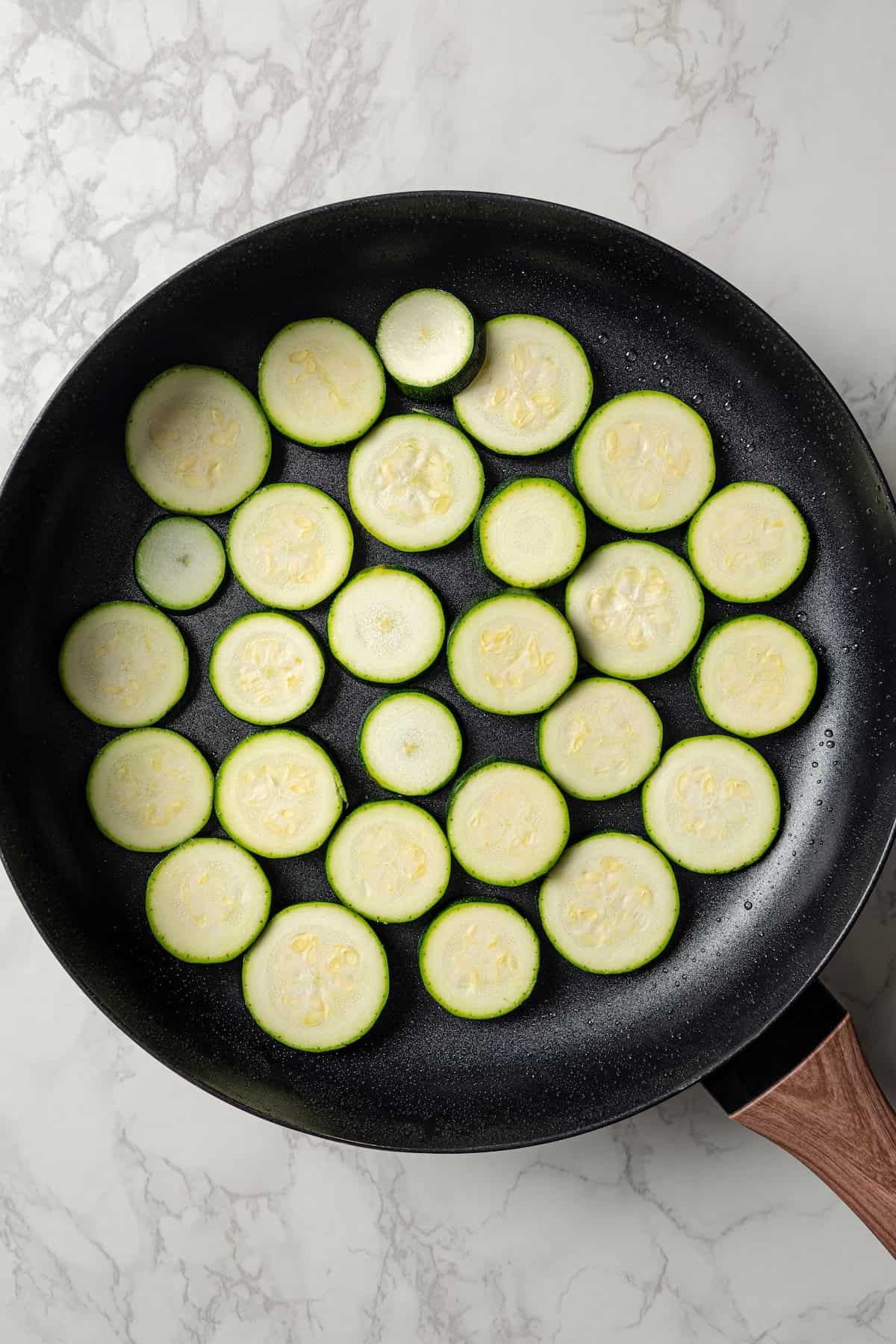

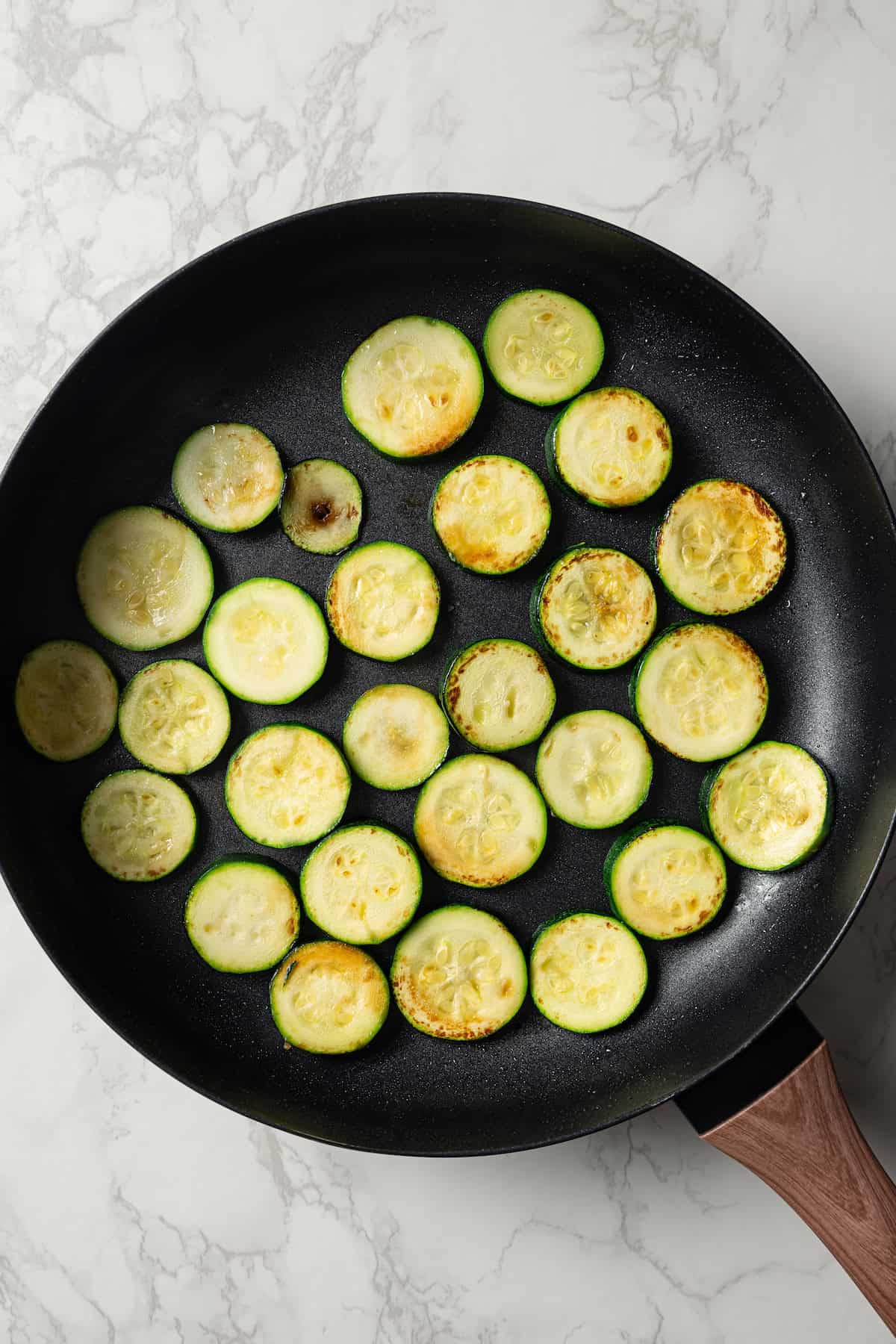

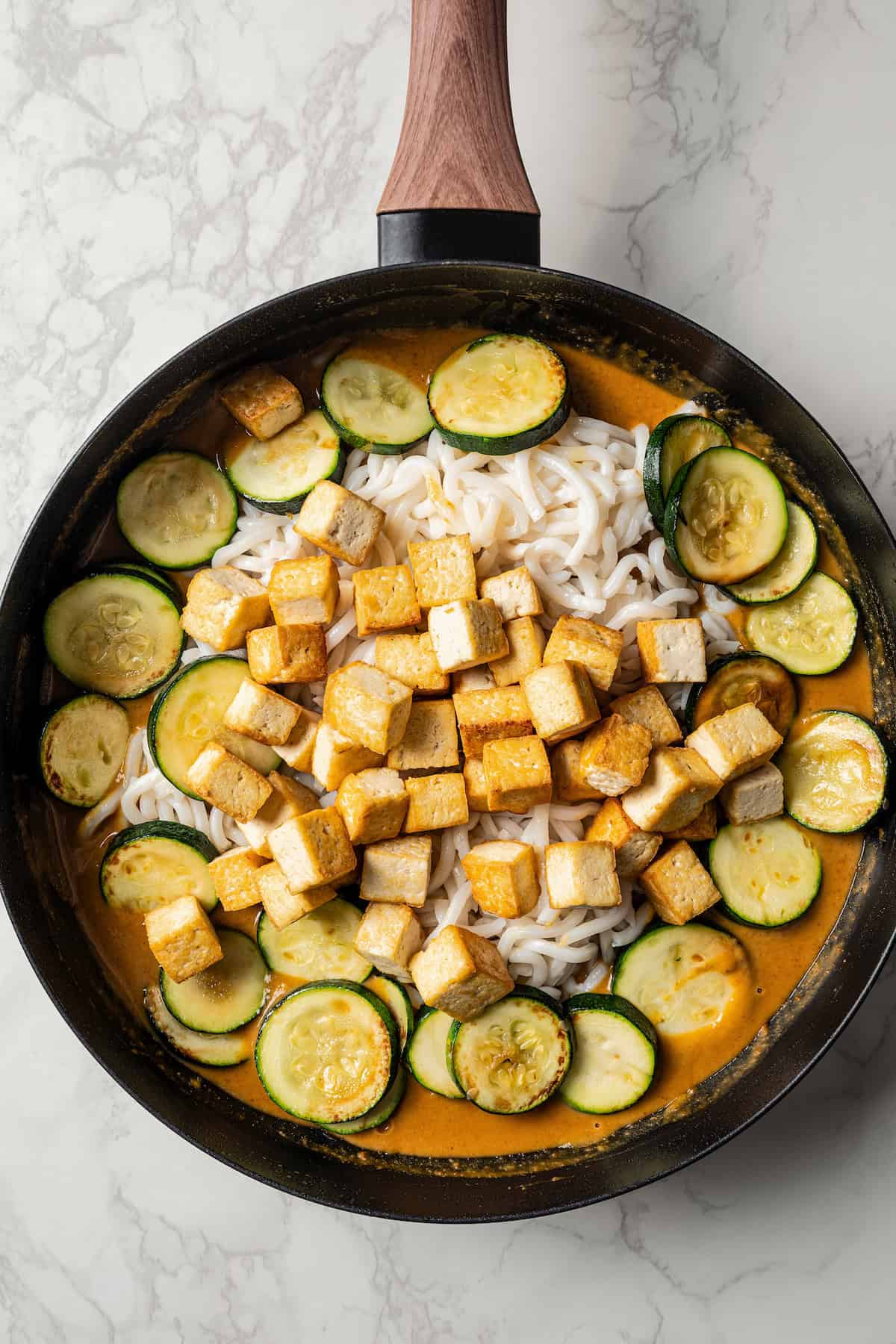

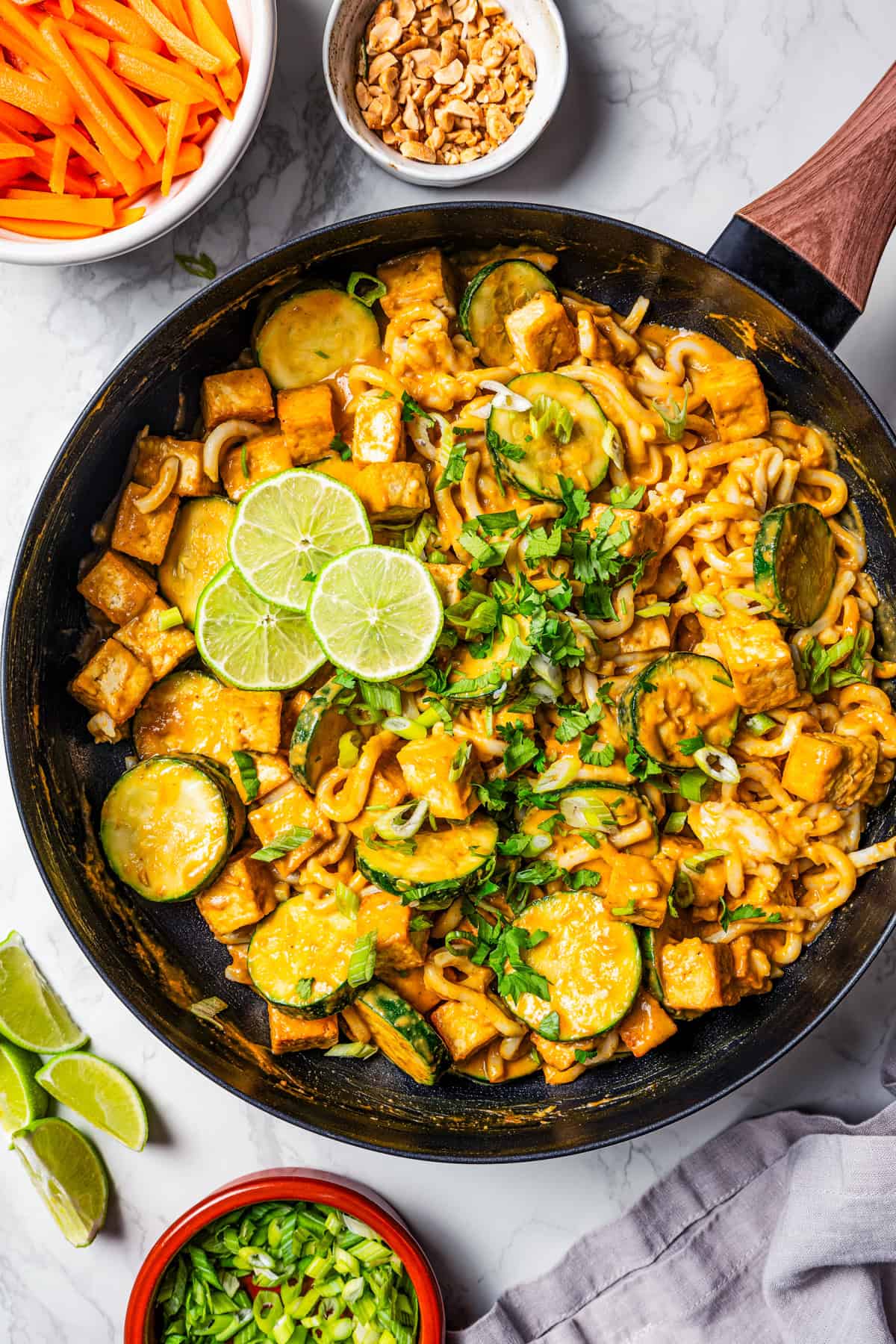

- Marinate the carrots. Place the shredded carrots in a medium bowl and toss them with some of the seasoned rice vinegar. Set aside.
- Make the tofu and noodles. Bring a pot of water to a boil and cook the udon according to the instructions on the package. While the water is heating up, cook the tofu in a large skillet until it’s golden and crisp on the edges. Transfer the tofu to a plate.
- Stir fry the zucchini. Add the zucchini and some water to the skillet, then season with salt and pepper. Cook until the zucchini is tender-crisp and just beginning to brown in spots. Transfer the zucchini to a heat-proof bowl.
- Make the peanut sauce. Heat some oil in the skillet, then add the garlic, ginger, and curry powder. Stir and cook until fragrant. Add 1 cup of water, then add the peanut butter, soy sauce, sugar, and remaining vinegar. Whisk until the peanut butter and water are well-combined, then bring to a simmer and cook until the sauce is thick enough to coat the back of a wooden spoon.
- Finish the noodles. Once the sauce has come together, add the noodles and toss to coat. Stir in the tofu and zucchini, then toss again. Remove from heat.
- Assemble the bowls. Divide the peanut noodles, tofu, and zucchini into bowls, then top them with the quick-pickled carrots and a drizzle of sesame oil plus chopped scallions. Serve the noodles with lime wedges.
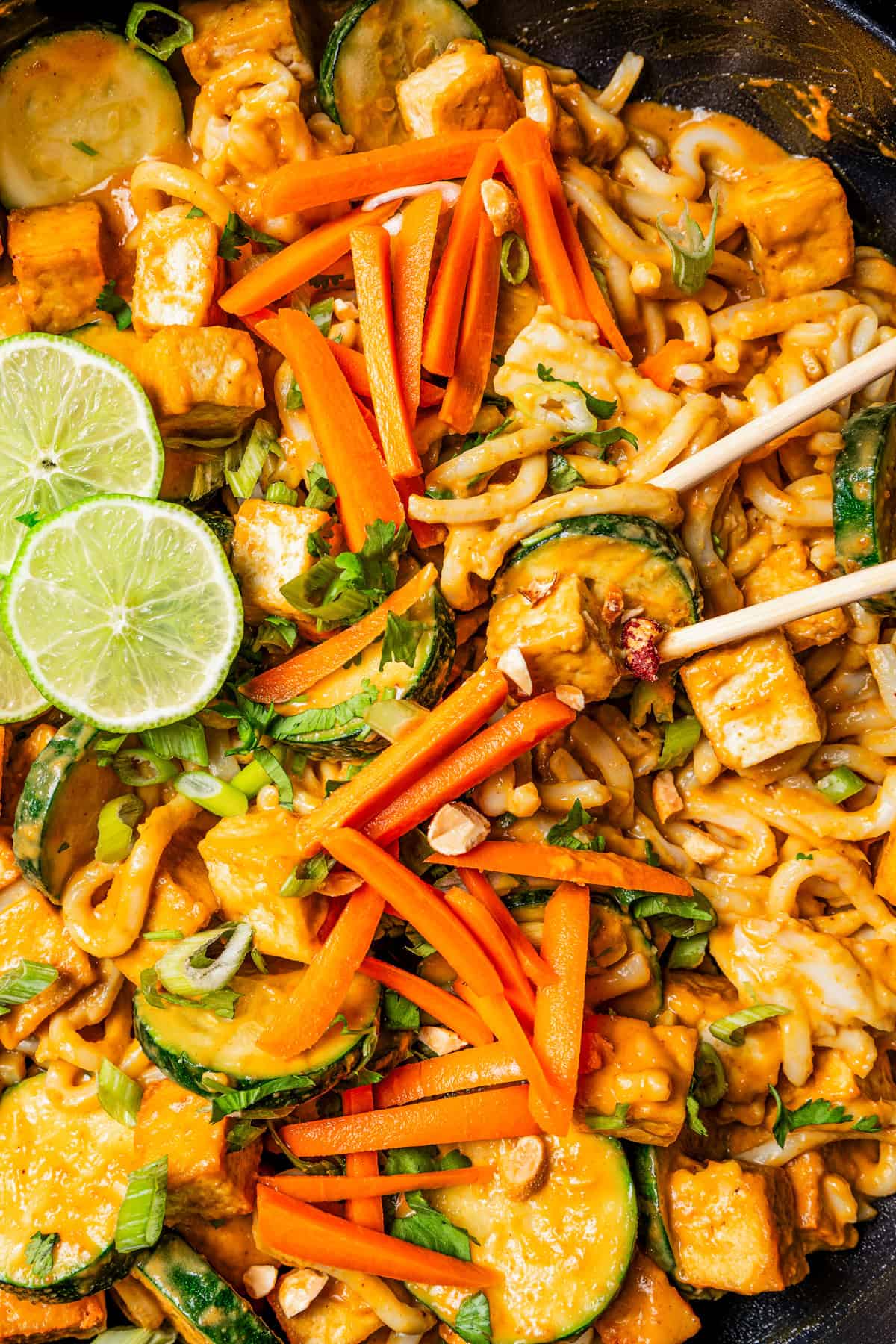

Recipe Tips
- Press the tofu. To ensure that the tofu soaks up all the peanut sauce, you’ll need to press the liquid out first. Use a tofu press if you have one; if not, place 2–3 folded paper towels on a plate, then put the tofu on top. Place a few more folded paper towels over the tofu and top with a plate or small cutting board. Put a few cans of beans or soup on the plate to weigh it down. Let the tofu sit like this for about 30 minutes, then proceed with the recipe.
- Meal prep for the win. Peanut noodles are really great for meal prep! If you’re making this recipe in advance for a family dinner, simply refrigerate the noodles, tofu, and zucchini in one container and the carrots in another. For work or school lunches, divide the noodles into individual airtight containers, then drain the carrots well and nestle them next to the noodles. Serve hot or cold — it’s good both ways!
- Make it your own. This recipe is easy to customize to your own tastes and preferences. Swap cucumbers for carrots; top with chopped peanuts, sesame seeds, or cilantro. Omit the tofu and add more veggies, or use cooked chicken instead.
Serving Suggestions
Though these peanut noodles with tofu and zucchini are a delicious and full meal on their own, you can easily pair them with a few extras for a complete feast. Serve it alongside some vegetable spring rolls, this amazing and spicy Asian cucumber salad, or a hot bowl of sizzling rice soup to round out the meal. These simple additions will take your dinner to the next level!
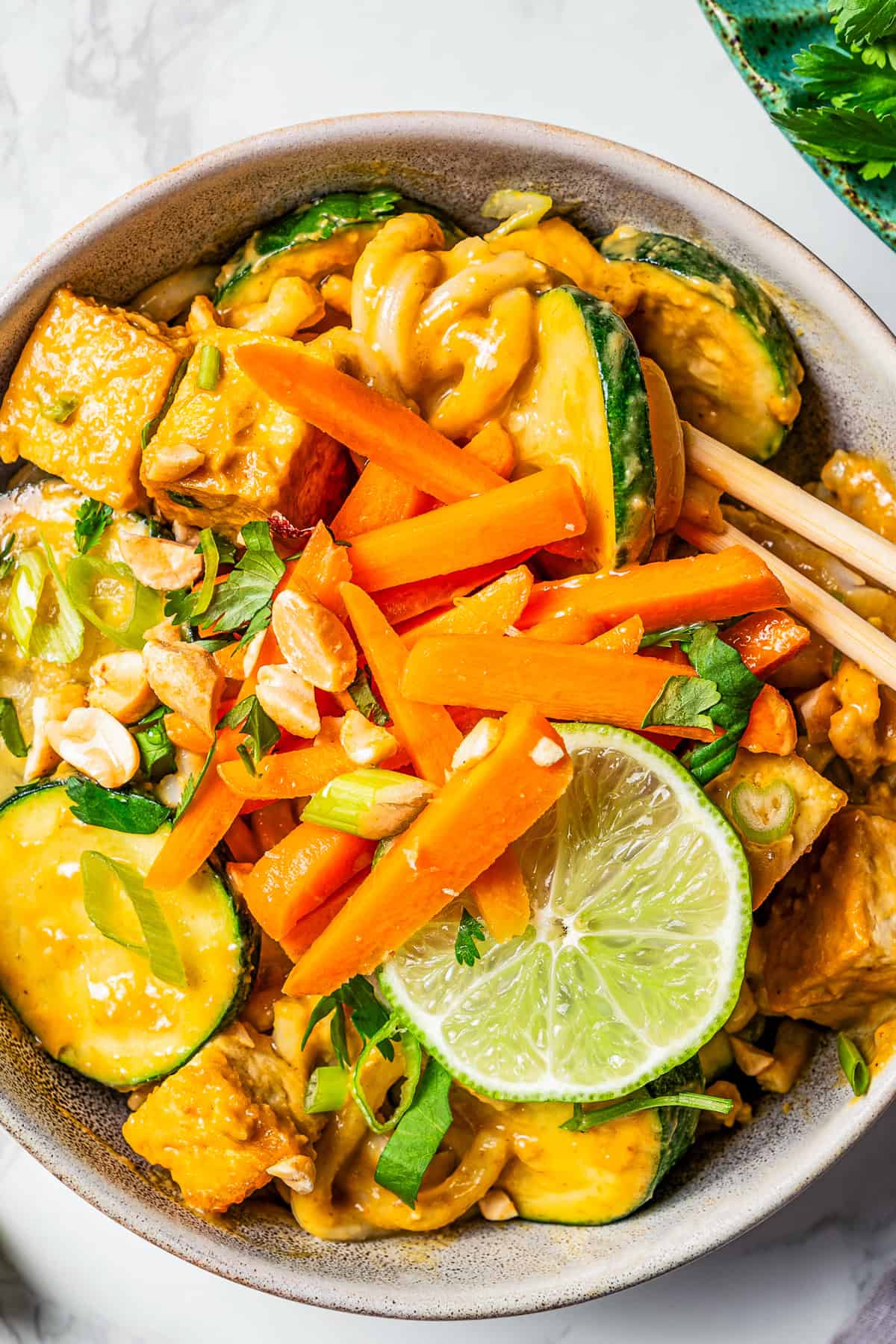

How to Store Reheat Leftovers
- Store in the fridge: Place your extras in airtight containers and store in the fridge for up to 4 days. I recommend storing the carrots separately.
- To reheat: You can enjoy peanut noodles cold, but you can also heat them up. (Don’t heat up the carrots, though — they’re better chilled and crisp.) Everything else can be placed in a microwave-safe bowl and heated for a minute or two, or until the noodles, tofu, and zucchini are warmed through.
More Noodles Recipes
Pin this now to find it later
-
Make the quick pickled carrots. In a medium bowl, combine the shredded carrots with 3 tablespoons of vinegar and set aside.
-
Cook the udon noodles. Bring a pot of water to a boil and cook the udon noodles according to package instructions. Set aside.
-
Cook the tofu. While the water is heating for the noodles, cook the tofu. In a large skillet, heat 1 tablespoon of peanut oil over medium heat. Add the tofu and season with a pinch of salt. Cook until the tofu is golden on all sides, then set aside.
-
Cook the zucchini. In the same skillet add the zucchini along with 1/4 cup of water. Season with a pinch of kosher salt and a quick sprinkle of black pepper. Cook for about 3 minutes, stirring frequently until the zucchini has softened a bit and has a touch of golden color. Transfer it to a bowl and set aside.
-
Make the peanut sauce. In the same skillet, add another tablespoon of peanut oil. Add the garlic, ginger, and curry powder. Stir around a bit until fragrant, about 30 seconds. Add 1 cup of water, the peanut butter, soy sauce, sugar, and the remaining 3 tablespoons of vinegar. Mix together with a whisk until combined, then bring to a simmer and cook, stirring occasionally, until the sauce has thickened a bit, about 3 minutes. If the sauce gets too thick, add more water to loosen things up a bit.
-
Add noodles and veggies. Add the cooked udon noodles to the skillet and toss to coat with the peanut sauce. Stir in the tofu and zucchini, tossing everything together to ensure everything is warmed through and coated in the peanut sauce.
-
Dig in. Serve the peanut noodles topped with shredded carrots, scallions, a drizzle of sesame oil, and a squeeze of a lime wedge.
Calories: 368kcal | Carbohydrates: 44g | Protein: 17g | Fat: 16g | Saturated Fat: 3g | Polyunsaturated Fat: 4g | Monounsaturated Fat: 6g | Sodium: 1000mg | Potassium: 478mg | Fiber: 5g | Sugar: 11g | Vitamin A: 4149IU | Vitamin C: 17mg | Calcium: 57mg | Iron: 2mg
Nutritional info is an estimate and provided as courtesy. Values may vary according to the ingredients and tools used. Please use your preferred nutritional calculator for more detailed info.



